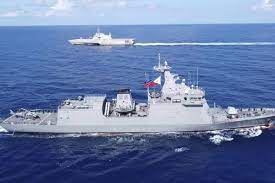MANILA, Philippines (AP): The Philippines and its treaty ally, the United States, separately condemned a high-seas assault Saturday by the Chinese coast guard together with suspected militia ships that repeatedly blasted water cannons to block three Philippine fisheries vessels from a disputed shoal in the South China Sea.
The noontime assault by China’s ships off the Scarborough Shoal, one of the most aggressive this year, caused “significant damage” to the communication and navigation equipment of one of the three Bureau of Fisheries and Aquatic Resources ships of the Philippines, Filipino officials said.
They said without elaborating that suspected militia vessels accompanying Chinese coast guard ships used a long-range acoustic device that could impair hearing causing “severe temporary discomfort and incapacitation to some Filipino crew.”
It’s the latest flare out of the long-seething territorial disputes in the South China Sea, a flashpoint in Asia that has put the U.S. and China on a collision course. China claims virtually the entire strategic waterway, but the Philippines, Vietnam, Malaysia, Brunei and Taiwan have also pressed their separate claims.
Territorial standoffs between China and the Philippines over a number of disputed offshore areas, including the Scarborough and the Second Thomas shoals, have been particularly heated this year. The U.S. has warned that it’s obligated to defend the Philippines, its longtime treaty ally, if Filipino forces, aircraft and ships come under an armed attack, including in the South China Sea.
China has warned the U.S. to stay away from what it calls a purely Asian dispute. It has deployed ships and aircraft to closely shadow U.S. Navy ships and aircraft which periodically undertake freedom of navigation and overflight patrols in one of the world’s most hotly disputed seas.
A Philippine government task force that deals with the long-seething territorial disputes said Saturday it “vehemently condemns the illegal and aggressive actions carried out by the Chinese coast guard and Chinese maritime militia against the civilian Bureau of Fisheries and Aquatic Resources vessels.”
U.S. Ambassador to Manila MaryKay Carlson condemned the People’s Republic of China’s “aggressive, illegal actions against the Philippine BFAR vessels lawfully operating in the Philippines’ exclusive economic zone.”
“This PRC behavior violates international law and endangers lives and livelihood,” Carlson said in a post on X, formerly Twitter. “We stand with our Philippine friends, partners, allies in support of a free and open Indo-Pacific.”
There was no immediate reaction from Chinese officials.
The Philippine fisheries bureau’s ships sailed to the Scarborough Shoal to provide humanitarian aid, mainly free fuel and Christmas grocery packs, to poor Filipino fishermen onboard nearly 30 boats in the rich but far-flung fishing area, Philippine officials said.
The swarm of Chinese coast guard and accompanying ships took dangerously aggressive actions, including the use of water cannons at least eight times, as the Philippine government ships approached about 2.6 kilometers to 3.5 kilometers (1.6 to 2 miles) from Scarborough Shoal, Philippine officials said.
They added that the Chinese coast guard installed a floating barrier at an entrance to the vast fishing lagoon of Scarborough Shoal and deployed personnel aboard small motor boats to drive away Filipino fishermen waiting for the distribution of fuel and food supplies at sea.
“To prevent the distribution of humanitarian support is not only illegal but also inhumane,” the Philippine government task force said.
In past faceoffs in the high seas off disputed shoals, the Chinese coast guard has used a military-grade laser that caused Filipino crewmen temporary blindness and resorted to dangerous blocking and shadowing maneuvers, including one that caused minor collisions.
Philippine President Ferdinand Marcos Jr. has allowed a larger U.S. military presence in local military bases under a 2014 defense pact partly to strengthen territorial defense amid China’s increasingly aggressive actions in the disputed waters. China has strongly opposed and expressed alarm over increasing deployments of U.S. forces, warning that it would threaten regional peace and stability.
The Philippines has also launched joint sea and air patrols separately with the U.S. and Australia and plans to expand this to a multilateral patrol, possibly including Japan and other like-minded nations to deter aggression in the South China Sea, National Security Adviser Eduardo Ano told reporters last week.







